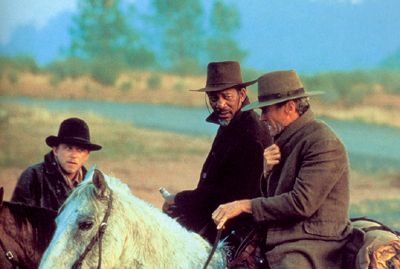|
30 Great Westerns
“Deserveís got nothing to do with it."
Clint Eastwoodís William Munny spits out these words as he prepares to kill Little Bill Daggett (Gene Hackman), and no finer epitaph was ever spoken.
Unforgiven is dark, depressing, and full of failed figures. Munnyís failure as a pig farmer mirrors his failure at reformation through the love of a good Christian woman. In discussing the virtues of his dead wife to Ned Logan (Morgan Freeman) and the Schofield Kid (Jaimz Woolnett), Munny lacks sincerity. He dismisses his past--"I ainít like that anymore, kid . . . My wife, she cured me of that, cured me of drink and wickedness." But his pleas sound more like memorized denials than truthful convictions and as the film evolves, Munnyís past darkness reemerges (reminiscent of Gary Cooperís past demons in Anthony Mannís Man of the West), tainting his usual avenging angel figure.
Eastwoodís two partners also come to realize that "deserveís got nothing to do with it." The Schofield Kid wanted to become a famed outlaw, but after shooting a man sitting in an outhouse, he laughs while crying, "Three shots and he was taking a shit." Thereís no glory in killing and justifications donít fit. "Well, I guess he had it coming," the Kid says, fighting back emotion. Munny refuses to absolve him. "We all have it coming, kid." Ned, too, canít stomach the killing, because it seems undeserved. He rides along to help out his old friend, Will, but when they shoot an unarmed kid off a horse, hit him in the belly and watch him slowly die while complaining of an unquenchable thirst, Ned, speechless, looks at Munny and shortly thereafter abandons the quest.
And sheriff Gene Hackman (Academy Award winner for best supporting actor), too, is a failure. His characterization echoes the Ahab-like hubris of Tom Dunson in Red River, representing another monarch who rules poorly. Little Bill doesnít justly punish the men who cut-up Delilah (played with fragile vulnerability by Anna Thomson), a prostitute. Instead, he treats her like property, demanding that Quick Mike and his sidekick bring in some good horses from the T-Bar ranch as reparations. The other prostitutes arenít pleased with this decision and place a bounty on the two menís heads. Their actions arenít deserved either (should the men be killed for what they did?). Later Bill further rules poorly, sadistically whupping an unarmed English Bob (Richard Harris) in the middle of the street, and after capturing Ned, another bounty hunter, he whips him and threatens, "Iím going to hurt you . . . not gentle like before, but bad," and he does.
Little Billís flawed, unfinished house becomes a metaphor for his and all of the charactersí shortcomings. Similar to the homeís odd angles and leaking holes, nothing in this film fits, nothing seems deserved. But of course, all of this chaos and these Western-myth revisions set-up the much deserved ending as Munny becomes the Clint Eastwood of High Plains Drifter (1972), doing another star turn with classic lines such as "Whoís the fella that owns this shithole," and actions that explode with sudden avenging violence.
--by Grant Tracey
|
